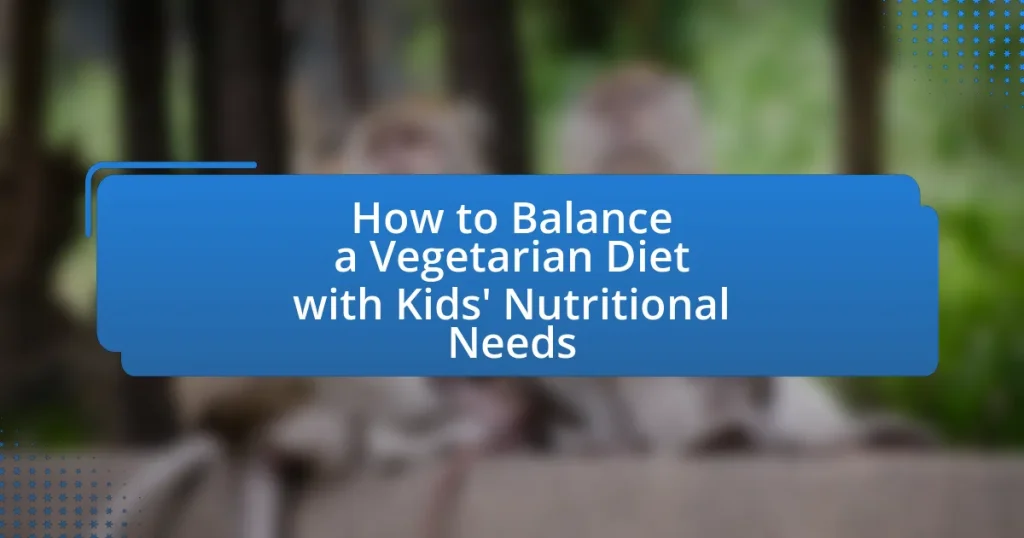A vegetarian diet, which excludes meat, fish, and poultry while emphasizing plant-based foods, is increasingly recognized for its importance in children’s nutrition. This article explores how a well-planned vegetarian diet can meet the essential nutritional needs of children, including protein, iron, calcium, and vitamins B12 and D, while promoting healthy growth and development. It discusses the various types of vegetarian diets, the potential health benefits, and the challenges families may face in ensuring balanced nutrition. Additionally, practical strategies for meal planning, addressing nutrient deficiencies, and involving children in the cooking process are provided to support families in adopting a vegetarian lifestyle.

What is a Vegetarian Diet and Why is it Important for Kids?
A vegetarian diet is a dietary pattern that excludes meat, fish, and poultry while including plant-based foods such as fruits, vegetables, grains, legumes, nuts, and seeds. This diet is important for kids because it can provide essential nutrients, promote healthy eating habits, and reduce the risk of chronic diseases. Research indicates that vegetarian diets can be nutritionally adequate for children when well-planned, offering benefits such as higher fiber intake and lower saturated fat consumption, which are linked to better health outcomes. For instance, a study published in the Journal of the American Dietetic Association found that vegetarian children often have lower body mass indexes and improved cholesterol levels compared to their non-vegetarian peers.
How does a vegetarian diet differ from other diets?
A vegetarian diet differs from other diets primarily by excluding meat, poultry, and fish while focusing on plant-based foods such as fruits, vegetables, grains, legumes, nuts, and seeds. This dietary choice emphasizes the consumption of whole foods and can lead to higher intake of dietary fiber, vitamins, and antioxidants compared to omnivorous diets. Research indicates that vegetarian diets are associated with lower risks of chronic diseases, such as heart disease and type 2 diabetes, due to their lower saturated fat content and higher nutrient density. For instance, a study published in the Journal of the American Dietetic Association found that vegetarians typically have lower cholesterol levels and blood pressure than non-vegetarians, supporting the health benefits of this dietary approach.
What are the main types of vegetarian diets?
The main types of vegetarian diets are lacto-vegetarian, ovo-vegetarian, lacto-ovo vegetarian, pescatarian, and vegan. Lacto-vegetarians consume dairy products but exclude eggs, while ovo-vegetarians include eggs but not dairy. Lacto-ovo vegetarians eat both dairy and eggs. Pescatarians eat fish in addition to plant-based foods, and vegans avoid all animal products entirely. These classifications help in understanding dietary choices and nutritional needs, especially when considering the balance required for children’s diets.
Why might families choose a vegetarian diet for their children?
Families might choose a vegetarian diet for their children to promote health and well-being. Research indicates that vegetarian diets can lead to lower risks of obesity, heart disease, and certain cancers, as they are often rich in fruits, vegetables, whole grains, and legumes. Additionally, a vegetarian diet can instill values of compassion and environmental awareness in children, as it aligns with ethical considerations regarding animal welfare and sustainability. Studies have shown that children on well-planned vegetarian diets can meet their nutritional needs effectively, supporting healthy growth and development.
What are the nutritional needs of children?
Children require a balanced intake of macronutrients and micronutrients to support their growth, development, and overall health. Specifically, they need carbohydrates for energy, proteins for growth and repair, and fats for brain development. Additionally, essential vitamins and minerals such as calcium, iron, vitamin D, and vitamin B12 are crucial for bone health, cognitive function, and the formation of red blood cells.
For instance, the American Academy of Pediatrics emphasizes that children aged 1-3 years need about 1,000 calories per day, with a focus on nutrient-dense foods to meet their developmental needs. Iron is particularly important, as studies show that iron deficiency can lead to developmental delays. Furthermore, calcium intake is vital for bone health, with recommendations suggesting 700 mg per day for children aged 1-3 years.
In summary, children’s nutritional needs encompass a variety of macronutrients and micronutrients essential for their growth and development, supported by guidelines from health organizations.
How do children’s nutritional needs change as they grow?
Children’s nutritional needs evolve significantly as they grow, primarily due to changes in their body size, metabolism, and developmental stages. Infants require high-fat diets for brain development, while toddlers need a balanced intake of carbohydrates, proteins, and fats to support rapid growth. As children enter school age, their energy requirements increase, necessitating a greater intake of vitamins and minerals, particularly calcium and iron, to support bone growth and overall health. Adolescents experience a surge in growth and hormonal changes, leading to increased caloric and nutrient needs, especially for protein and iron, to support muscle development and menstruation in girls. These shifts highlight the importance of adapting dietary choices, particularly in vegetarian diets, to ensure adequate intake of essential nutrients at each growth stage.
What essential nutrients should be prioritized in a child’s diet?
Essential nutrients that should be prioritized in a child’s diet include protein, iron, calcium, vitamin D, omega-3 fatty acids, and vitamins B12 and A. Protein is crucial for growth and development, while iron supports cognitive function and energy levels; sources include legumes and fortified cereals. Calcium and vitamin D are vital for bone health, with dairy products and fortified plant-based alternatives providing these nutrients. Omega-3 fatty acids, found in flaxseeds and walnuts, are important for brain development. Vitamins B12 and A, essential for neurological function and vision, can be obtained from fortified foods and colorful fruits and vegetables. These nutrients collectively ensure that children receive balanced nutrition, particularly in a vegetarian diet.
How can a vegetarian diet meet children’s nutritional needs?
A vegetarian diet can meet children’s nutritional needs by providing a variety of plant-based foods that supply essential nutrients. Key nutrients such as protein, iron, calcium, and vitamins B12 and D can be obtained from legumes, nuts, seeds, whole grains, dairy products, and fortified foods. For instance, legumes and tofu are excellent sources of protein, while leafy greens and fortified plant milks can provide calcium. Research from the American Dietetic Association indicates that well-planned vegetarian diets are nutritionally adequate and can support healthy growth in children. Additionally, incorporating a diverse range of fruits and vegetables ensures that children receive necessary vitamins and minerals for their development.
What are the key nutrients found in vegetarian foods?
Key nutrients found in vegetarian foods include protein, iron, calcium, fiber, vitamins B12 and D, and omega-3 fatty acids. Protein is essential for growth and development, and vegetarian sources include legumes, nuts, and seeds. Iron, important for oxygen transport in the blood, is found in lentils, chickpeas, and fortified cereals. Calcium, crucial for bone health, is present in leafy greens, tofu, and fortified plant milks. Fiber aids digestion and is abundant in whole grains, fruits, and vegetables. Vitamin B12, necessary for nerve function and found primarily in animal products, can be obtained through fortified foods or supplements. Vitamin D, important for calcium absorption, can be sourced from fortified foods and sunlight exposure. Omega-3 fatty acids, beneficial for heart health, are found in flaxseeds, chia seeds, and walnuts. These nutrients are vital for maintaining a balanced vegetarian diet, especially for children.
How can parents ensure their children get enough protein on a vegetarian diet?
Parents can ensure their children get enough protein on a vegetarian diet by incorporating a variety of protein-rich foods such as legumes, nuts, seeds, dairy products, and whole grains into their meals. Legumes like lentils and chickpeas provide substantial protein; for instance, one cup of cooked lentils contains about 18 grams of protein. Nuts and seeds, such as almonds and chia seeds, also contribute significantly, with two tablespoons of chia seeds offering around 4 grams of protein. Dairy products like yogurt and cheese are excellent sources as well, with one cup of Greek yogurt containing approximately 20 grams of protein. Whole grains, including quinoa and farro, can further enhance protein intake, with one cup of cooked quinoa providing about 8 grams of protein. By combining these foods, parents can create balanced meals that meet their children’s protein needs effectively.
What challenges might arise when balancing a vegetarian diet for kids?
Balancing a vegetarian diet for kids can present challenges such as ensuring adequate intake of essential nutrients like protein, iron, calcium, and vitamin B12. Children require these nutrients for growth and development, and vegetarian sources may not always provide sufficient amounts. For instance, iron from plant sources is less easily absorbed by the body compared to iron from meat, which can lead to deficiencies if not properly managed. Additionally, vitamin B12 is primarily found in animal products, making it crucial for vegetarian children to consume fortified foods or supplements to meet their needs. These nutritional gaps can affect children’s energy levels, cognitive function, and overall health if not addressed appropriately.
How can parents address potential nutrient deficiencies?
Parents can address potential nutrient deficiencies by ensuring a well-planned vegetarian diet that includes a variety of foods rich in essential nutrients. This involves incorporating sources of protein, iron, calcium, vitamin B12, and omega-3 fatty acids, which are critical for children’s growth and development. For instance, legumes, nuts, seeds, whole grains, and fortified foods can provide necessary nutrients. Research indicates that children on vegetarian diets may be at risk for deficiencies in vitamin B12 and iron; therefore, parents should consider fortified cereals or supplements as needed. Regular consultations with a pediatrician or a registered dietitian can also help tailor dietary plans to meet individual nutritional needs effectively.
What common misconceptions exist about vegetarian diets for children?
Common misconceptions about vegetarian diets for children include the belief that these diets lack sufficient protein, essential nutrients, and are inherently unhealthy. Many people assume that children cannot get enough protein from plant-based sources, but studies show that legumes, nuts, seeds, and whole grains can provide adequate protein for growth and development. Additionally, there is a misconception that vegetarian diets lead to deficiencies in iron and calcium; however, foods like lentils, tofu, fortified plant milks, and leafy greens can supply these nutrients effectively. Furthermore, some believe that vegetarian diets are not suitable for children due to concerns about growth; research indicates that well-planned vegetarian diets can support healthy growth and development in children, as long as they are balanced and include a variety of foods.
How can parents effectively plan meals for vegetarian kids?
Parents can effectively plan meals for vegetarian kids by ensuring a balanced intake of essential nutrients such as protein, iron, calcium, and vitamins B12 and D. Incorporating a variety of plant-based foods like legumes, whole grains, nuts, seeds, fruits, and vegetables helps meet these nutritional needs. For instance, lentils and chickpeas provide protein and iron, while fortified plant milks can supply calcium and vitamin D. Research indicates that children on vegetarian diets can achieve adequate nutrition when meals are thoughtfully planned, as highlighted in the study “Nutritional Considerations for Vegetarian Children” published in the Journal of the American Dietetic Association. This study emphasizes the importance of diverse food choices to prevent deficiencies and promote healthy growth.
What are some easy vegetarian meal ideas for children?
Easy vegetarian meal ideas for children include vegetable stir-fry with tofu, whole grain pasta with marinara sauce and vegetables, and quesadillas filled with cheese and beans. These meals are not only simple to prepare but also provide essential nutrients. For instance, a vegetable stir-fry can include a variety of colorful vegetables, which are rich in vitamins and minerals, while tofu adds protein. Whole grain pasta offers fiber and energy, and quesadillas can be made with whole wheat tortillas, providing additional nutrients. These options cater to children’s taste preferences while ensuring they receive a balanced diet.
How can parents involve kids in meal planning and preparation?
Parents can involve kids in meal planning and preparation by encouraging them to choose recipes and ingredients, allowing them to assist in cooking tasks, and discussing the nutritional value of meals. Engaging children in these activities fosters their interest in food and teaches them about healthy eating habits. Research indicates that children who participate in meal preparation are more likely to try new foods and develop a positive relationship with healthy eating, as highlighted in a study published in the Journal of Nutrition Education and Behavior.
What tips can help parents maintain a balanced vegetarian diet for their kids?
To maintain a balanced vegetarian diet for kids, parents should ensure that meals include a variety of fruits, vegetables, whole grains, legumes, nuts, and seeds. This diversity provides essential nutrients such as protein, iron, calcium, and vitamins B12 and D, which are crucial for children’s growth and development. For instance, incorporating lentils and chickpeas can supply protein and iron, while fortified plant-based milk can offer calcium and vitamin D. Research indicates that a well-planned vegetarian diet can meet the nutritional needs of children, as long as it is varied and includes fortified foods or supplements when necessary.
How can parents ensure variety in their children’s vegetarian meals?
Parents can ensure variety in their children’s vegetarian meals by incorporating a wide range of fruits, vegetables, grains, legumes, nuts, and seeds into their diets. This approach not only introduces different flavors and textures but also provides essential nutrients. For instance, rotating between various types of beans, such as black beans, chickpeas, and lentils, can enhance protein intake while offering diverse tastes. Additionally, using seasonal produce encourages exploration of new ingredients, which can lead to a more balanced diet. Research indicates that children exposed to a variety of foods are more likely to develop healthy eating habits, as noted in a study published in the journal Appetite, which emphasizes the importance of dietary diversity for children’s nutritional needs.
What resources are available for parents seeking guidance on vegetarian nutrition?
Parents seeking guidance on vegetarian nutrition can access a variety of resources, including books, websites, and professional organizations. Notable books such as “The Vegetarian Family Cookbook” by Tami H. K. and “Plant-Powered Families” by Dreena Burton provide practical recipes and nutritional advice tailored for families. Websites like the Academy of Nutrition and Dietetics offer evidence-based information on vegetarian diets, while organizations such as the Vegetarian Resource Group provide resources specifically aimed at families and children. These resources are designed to help parents ensure their children receive balanced nutrition while following a vegetarian diet.
What are the best practices for transitioning kids to a vegetarian diet?
The best practices for transitioning kids to a vegetarian diet include gradually introducing plant-based foods, ensuring a balanced intake of essential nutrients, and involving children in meal planning. Gradual introduction helps kids adapt to new flavors and textures, making the transition smoother. A balanced vegetarian diet should include a variety of fruits, vegetables, whole grains, legumes, nuts, and seeds to meet nutritional needs, particularly protein, iron, calcium, and vitamin B12. Involving children in meal planning fosters interest and ownership over their food choices, which can lead to healthier eating habits. Research indicates that children who participate in food preparation are more likely to try new foods and maintain a balanced diet.
How can parents introduce vegetarian meals gradually?
Parents can introduce vegetarian meals gradually by starting with familiar dishes and substituting meat with plant-based proteins. For example, they can replace ground beef in tacos with lentils or black beans, which provides similar texture and protein content. Research indicates that gradual changes in diet can lead to better acceptance; a study published in the Journal of Nutrition Education and Behavior found that children are more likely to embrace new foods when they are introduced alongside their favorite meals. Additionally, parents can involve children in meal planning and preparation, which increases their interest in trying vegetarian options.
What strategies can help kids embrace a vegetarian lifestyle?
To help kids embrace a vegetarian lifestyle, parents can introduce plant-based meals gradually, making them appealing and fun. Engaging children in meal preparation fosters interest and allows them to explore various vegetarian options, such as colorful fruits and vegetables, whole grains, and legumes. Research indicates that children are more likely to adopt healthy eating habits when they are involved in the cooking process, as it enhances their understanding of nutrition and food choices. Additionally, providing education about the benefits of vegetarianism, including health advantages and environmental impact, can motivate kids to make informed dietary decisions.


